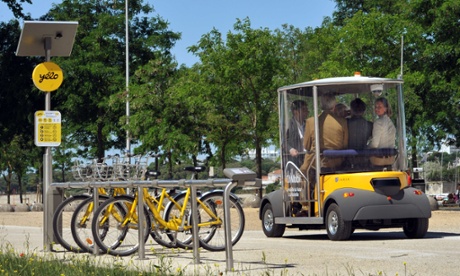
Driverless cars will need to be protected from hackers who could take control of vehicles to cause chaos on the roads, cyber security and transport experts have warned.
While autonomous vehicles, such as Google’s self-driving car, could reduce road casualties by eliminating human error, they could also increase the risk of accidents amongst motorists who continue to use manual cars if they are allowed to mix on the same roads.
Recent research conducted in driving simulators has shown that human drivers change their behaviour when using the same road as autonomous cars by copying the driving styles and leaving less space between the vehicle in front.
While an autonomous vehicle equipped with sensors would be able to react almost instantaneously, reaction times in human drivers are slower.
The warnings come as the Institution of Engineering and Technology (IET) publishes a report on autonomous vehicles and how they can be integrated onto British roads.
It predicts that within 15 years there will be fully autonomous vehicles taking goods and people around Britain, bringing cheaper and safer mobility for passengers.
Driverless cars could also lead to more people living in the countryside as the vehicles will make it easier to get around in rural locations without being able to drive.
This could prove particularly beneficial for older people who retire to the countryside and find they can no longer drive themselves as they get older, yet still need to access shops and healthcare.
The first driverless vehicles are expected to begin appearing on Britain’s roads from January next year under a series of trials to be conducted in three cities by the Department for Transport.
However, Hugh Boyes, cyber security lead at the IET, said the reliability and security of software used in driverless cars will be a major issue for manufacturers and insurers.
He said: “If the hacker community could start to target vehicles we can imagine a fair amount of chaos.
“The motor industry is really strong on safety but if someone tries to interfere with the vehicle, tries to hack it and disrupt it, then these don’t fall under the typical safety issues.
“Unfortunately living in the world today people do try to tamper with technology. The industry is only just starting to recognise this.”
He also said that software would have to be reliable and bug free. “Recent reports analysing software show that 98% of applications have serious defects and in many cases there were 10-15 defects per application,” he said.
“If ultimately you want to use autonomous vehicles, we need to make sure they don’t have a defect.”
Earlier this year Vince Cable, the business secretary, announced that trials of driverless vehicles on public roads will begin in Britain in January 2015.
In January Newcastle will also start trialling technology where traffic lights can communicate with vehicles to help traffic flow more smoothly.
Major companies including Nissan and Volvo have already begun testing driverless cars in other countries while Google’s own driverless car has clocked up more than 1m miles on the open road.
During that time Google has said its autonomous vehicle was only involved in one accident, which occurred when a human driver took control.
Experts predict that using such vehicles can help improve road safety and allow busy road networks to cope with greater numbers of vehicles.
Autonomous cars, fitted with radar systems, cameras and other sensors to detect their surroundings, will be able to drive closer together while those connected to central networks can be rerouted to ease congestion.
According to Dr Nick Reed, principal human factors researcher at the Transport Research Laboratory in Crowthorne, Berkshire, 95% of the 1.2m annual deaths worldwide on the road involve human error. However, he warned that integrating human drivers and autonomous vehicles on the roads at the same time could present serious challenges.

